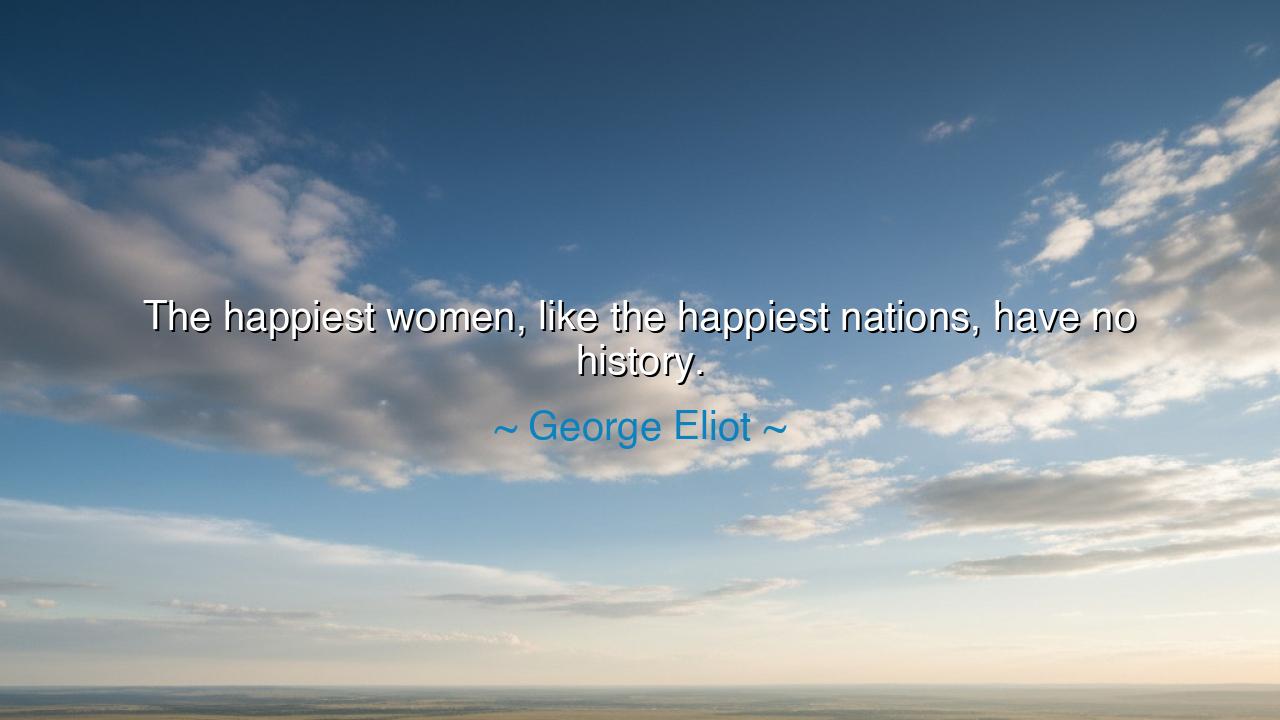
The happiest women, like the happiest nations, have no history.






When George Eliot wrote, “The happiest women, like the happiest nations, have no history,” she spoke with the quiet irony of one who had witnessed both struggle and silence, both the cost of peace and the glory of survival. Beneath her words lies a truth woven from paradox: that happiness often leaves no record, while suffering inscribes itself in the chronicles of time. Nations remembered by history are those torn by war, revolution, or rebirth; so too, the lives most told are those marked by turmoil, transformation, and defiance. Eliot, ever the philosopher of the heart, reminds us that tranquility, though invisible, is no less real — it simply leaves no scars deep enough to demand remembrance.
To understand this, one must know the woman behind the name. George Eliot, born Mary Ann Evans, lived in the nineteenth century, a time when a woman who thought deeply was a scandal and one who wrote seriously was almost unthinkable. She took a man’s name not out of deceit, but out of necessity — to free her mind from the chains of prejudice. Through her novels, she gave voice to the unheard and revealed the interior lives of women long confined to silence. Yet even she, who lived boldly and suffered the weight of judgment, looked upon happiness as a state too gentle for history’s harsh ink. For Eliot knew that the chronicles of the world are written in conflict, and peace, though precious, is often passed over in the telling.
When she compares women to nations, her meaning deepens. A nation without history is one untouched by conquest, by rebellion, by the storm of transformation — a people who live in quiet prosperity, who need not fight to prove their worth. Such a nation may seem unremarkable, yet it is, in truth, blessed. And so it is with the happiest of women — those whose lives flow in harmony, who know neither oppression nor the need to resist it, whose souls are not bruised by the world’s injustice. But Eliot’s statement, tinged with melancholy, reminds us how rare such peace is. For throughout much of history, the stories of women have been born from endurance, not ease — from survival in a world that often denied them voice, freedom, and recognition.
Consider, for example, Joan of Arc, that radiant flame of faith and rebellion. Hers is a story that history will never forget — because her life was consumed in struggle, her happiness sacrificed to purpose. She stood against kings and armies, guided by visions she believed divine, and though her courage transformed a nation, her peace was short-lived. Burned at the stake, she became immortal not through joy, but through suffering. So it is that the world remembers the wounded, the brave, the restless — and forgets the contented. History is carved from pain, not from serenity. The happiest women, like the happiest nations, leave behind no monuments because they have no need for them.
Yet Eliot’s quote is not cynical; it is meditative. It asks us to ponder what we truly value — the noise of fame or the stillness of fulfillment. In a world that glorifies conflict and worships achievement, Eliot suggests that perhaps the highest blessing is to live a life unrecorded by tragedy or turmoil. To have “no history” is not to be insignificant, but to have found peace so complete that it needs no defense. The river that flows without storm still nourishes the earth; the heart that beats quietly still sustains life. Happiness, true and profound, is often invisible to those who seek glory, yet it is the foundation of every civilization and every soul that endures.
And yet, there is another layer — a whisper of sorrow beneath her wisdom. For Eliot knew that the very reason women had “no history” was not always happiness, but erasure. Many women who fought, thought, and dreamed were left unrecorded, their lives dismissed by chroniclers who deemed their deeds unworthy of ink. Thus, her quote holds both truth and challenge: that happiness may lie in obscurity, but obscurity must never be mistaken for justice. The happiest nations may be those free from turmoil, but the forgotten women may simply be those denied their due remembrance.
So, O listener of wisdom and seeker of peace, take this double-edged truth to heart. Aspire not only to make history, but to live a life of depth, kindness, and balance. If happiness finds you, cherish it, even if no one sings of it. And if the world calls you to struggle, let that struggle be noble — not for fame, but for freedom. For history is written in fire, but the future is built in calm.
In the end, Eliot’s words are both lament and benediction: that to be happy may mean to be unseen, and that to be remembered may mean to have suffered. Yet each has its place in the grand design of life. Let us, therefore, not envy the famous nor pity the forgotten, but seek instead that rarest of blessings — a heart at peace, content to have no history, because it has found harmony within itself.






AAdministratorAdministrator
Welcome, honored guests. Please leave a comment, we will respond soon